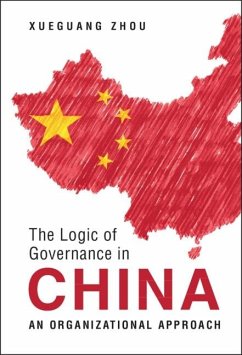Drawing on more than a decade of fieldwork, The Logic of Governance in China develops a unified theoretical framework to explain how China's centralized political system maintains governance and how this process produces recognizable policy cycles that are obstacles to bureaucratic rationalization, professionalism, and rule of law. The book is unique for the overarching framework it develops; one that sheds light on the interconnectedness among apparently disparate phenomena such as the mobilizational state, bureaucratic muddling through, collusive behaviors, variable coupling between policymaking and implementation, inverted soft budget constraints, and collective action based on unorganized interests. An exemplary combination of theory-motivated fieldwork and empirically-informed theory development, this book offers an in-depth analysis of the institutions and mechanisms in the governance of China.
Dieser Download kann aus rechtlichen Gründen nur mit Rechnungsadresse in A, B, BG, CY, CZ, D, DK, EW, E, FIN, F, GR, HR, H, IRL, I, LT, L, LR, M, NL, PL, P, R, S, SLO, SK ausgeliefert werden.









